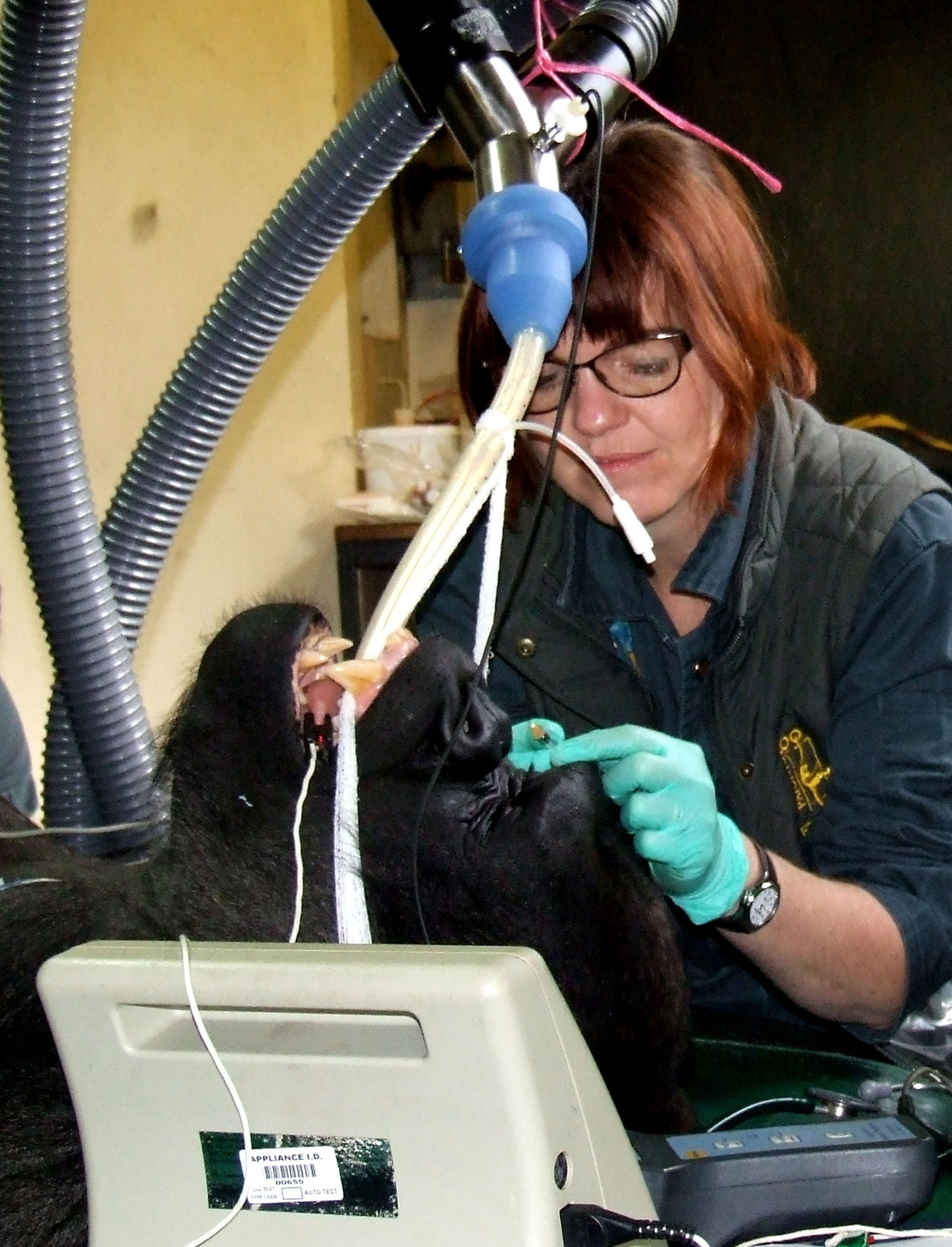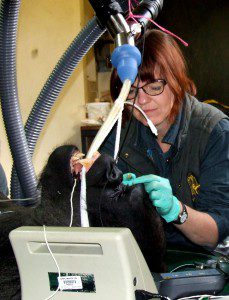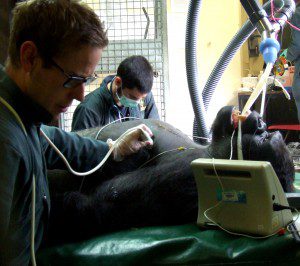The 365 pound gorilla lying on his back on a bed of straw is helping medical science. Researchers are at Paignton Zoo Environmental Park to collect information on his heart in an attempt to understand heart disease in great apes – including humans.
Upstairs, visitors gaze in wonder at the interactions of the other gorillas. Downstairs, experienced professionals – most of them part of Paignton Zoo’s in-house team – monitor blood pressure, breathing and pulse.
Matadi, a 12-year old Western lowland gorilla, is having a routine check-up before moving to another collection – Howletts Wild Animal Park in Kent. In addition, researchers from Cardiff Metropolitan University are collecting data on his heart.
The International Primate Heart Project is based at Cardiff Metropolitan University and led by Professor of Cardiovascular Physiology Rob Shave. Two of his colleagues are at Paignton Zoo: Mike Stembridge, a cardiovascular physiologist studying for his PhD specialising in cardiac ultrasound; and Javier Martinez, a qualified vet who is studying for his PhD examining the electrocardiogram in great apes.
The IPHP works with zoos, sanctuaries and other bodies around the world. It’s one of a number of such studies; EAZA, the European Association of Zoos and Aquaria, is developing a collaborative approach to the investigation of cardiovascular disease among the great ape population in European zoos.
Matadi is impressive. His feet look like hands and his hands look like cycle helmets. His head is huge; his chest is deep and broad. There’s what appears to be a tube from a vacuum cleaner in his mouth – it’s part of the system that’s keeping him breathing. Although he is motionless save for the rise and fall of his massive chest, there’s a bustle of activity around him. A team of nine zoo keepers, vets and vet nurses is hard at work.
The procedures are familiar: he has an ultrasound scan, complete with cold gel on the end of a probe. There’s a saline drip hanging overhead. Then there’s the ECG, complete with electrodes stuck to his hairy chest. It’s probably just as well that he’ll still be unconscious when it’s time to peel those off…
Mike: “We are collecting information about heart health in great apes. This includes ultrasound images of the heart to look at structure and function and an ECG which examines the electrical activity of the heart.
“It’s thought that heart disease is the leading cause of death in great apes, however, the exact causes are unknown. Using human cardiology techniques we hope to explore the cause of heart disease in the animals in order to help vet teams to provide the best possible care for these animals.
“In addition, we are interested in exploring differences between human and ape hearts in an attempt to understand the evolution of the human heart and how this may predispose us to disease.”
They have collected data at UK and European collections and at sanctuaries in Congo, Cameroon and Zambia. So far they have assessed over 350 animals. “The majority have been chimpanzees, however we have also collected data from gorillas, bonobos and orang utans.”
The data will help to define what is normal for a great ape heart. Setting normal reference data will enable vets to effectively assess heart health in their animals. It’s hoped the work will help vets in zoos and sanctuaries, but in time understanding the cause of heart disease in the great apes may help to inform breeding and re-introduction programmes as well.
Are there any implications for human medicine? “It is possible that our work will help show how the human heart has evolved and perhaps tell us why humans seem especially susceptible to certain heart diseases such as coronary artery disease.”
And the verdict on Matadi? It appears that he is currently in good cardiac health, which is good news for the females in the breeding group he is joining in Kent… Paignton Zoo Environmental Park is a registered charity. For more information go to www.paigntonzoo.org.uk or ring 0844 474 2222. http://primateheartproject.co.uk




























